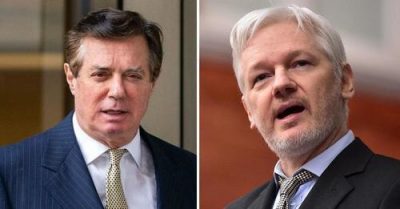Top Ecuadorian Diplomat Destroys Guardian’s Claim that Manafort Visited Assange

A former consul and first secretary at the Ecuadorian embassy in London has put the final nail in the coffin of credibility for The Guardian, refuting the paper’s fantastical and wholly unsupported claim that former Trump campaign manager Paul Manafort visited WikiLeaks founder Julian Assange in 2013, 2015 and the spring of 2016 – a charge vehemently denied by all parties involved.
Fidel Narváez – who worked at Ecuador’s London embassy from 2010 – 2018 has told The Canary that The Guardian‘s claim is entirely false. The Canary has also reviewed a copy of correspondence between the Guardian and Narváez in which he makes a formal complaint accusing the paper of fabricating an earlier story about a Kremlin plot to smuggle Assange to Russia.
Both WikiLeaks and Manafort have said they plan to sue The Guardian over the publication, with Manafort slamming the report as “totally false and deliberately libellous.”
Narváez – initially consul and then first secretary at the embassy, told the Canary that to his knowledge, Manafort never visited the embassy while he was employed there. What’s more, his account supports points made by The Intercept‘s Glenn Greenwald about visitation rights at the embassy.
It is impossible for any visitor to enter the embassy without going through very strict protocols and leaving a clear record: obtaining written approval from the ambassador, registering with security personnel, and leaving a copy of ID. The embassy is the most surveilled on Earth; not only are there cameras positioned on neighbouring buildings recording every visitor, but inside the building every movement is recorded with CCTV cameras, 24/7. In fact, security personnel have always spied on Julian and his visitors. It is simply not possible that Manafort visited the embassy.
The Guardian responded to Narváez’s comments, stating:
“This story relied on a number of sources. We put these allegations to both Paul Manafort and Julian Assange’s representatives prior to publication. Neither responded to deny the visits taking place. We have since updated the story to reflect their denials.”
WikiLeaks, meanwhile, bet The Guardian “a million dollars and its editor’s head that Manafort never met Assange.”
This is going to be one of the most infamous news disasters since Stern published the "Hitler Diaries".
— WikiLeaks (@wikileaks) November 27, 2018
No word on whether they’ve taken the organization up on its offer.
*
Note to readers: please click the share buttons above. Forward this article to your email lists. Crosspost on your blog site, internet forums. etc.
Featured image is from Zero Hedge

